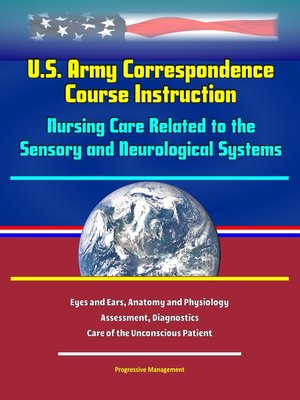U.S. Army Correspondence Course Instruction
ebook ∣ Nursing Care Related to the Sensory and Neurological Systems--Eyes and Ears, Anatomy and Physiology, Assessment, Diagnostics, Care of the Unconscious Patient
By Progressive Management

Sign up to save your library
With an OverDrive account, you can save your favorite libraries for at-a-glance information about availability. Find out more about OverDrive accounts.
Find this title in Libby, the library reading app by OverDrive.



Search for a digital library with this title
Title found at these libraries:
| Library Name | Distance |
|---|---|
| Loading... |
Professionally converted for accurate flowing-text e-book format reproduction, this is a reproduction of a U.S. Army Correspondence Course Instruction: Nursing Care Related to the Sensory and Neurological Systems.
Contents: Chapter 1 - Nursing Care Related to the Sensory System * Section I. Introduction to the Special Senses * Section II. Assessment * Section III. Treatments and Procedures * Section IV. Disorders of the Eye * Section V. Disorders of the Ear * Chapter 2 - Nursing Care Related to the Neurological System * Section I. Anatomy and Physiology * Section II. Neurological Assessment * Section III. Diagnostic Procedures * Section IV. Care of the Unconscious Patient * Section V. Infectious Nervous System Disorders * Section VI. Degenerative Nervous System Disorders * Section VII. Cranial Nerve Disorders * Section VIII. Head and Spine Injuries * Section IX. Disorders of the Brain
The human body is continuously bombarded by all kinds of stimuli. Some of these stimuli are received by sensory receptors distributed throughout the entire body. Other stimuli are received by highly complex receptor organs. These are referred to as the special senses. From each special sense organ, information is sent to the brain through specific cranial nerves. When the information reaches the specific area of the brain's cerebral cortex, it is perceived at the conscious level as sight, sound, smell, taste, and balance. These special senses allow us to detect changes in our environment, providing information necessary for homeostasis.







